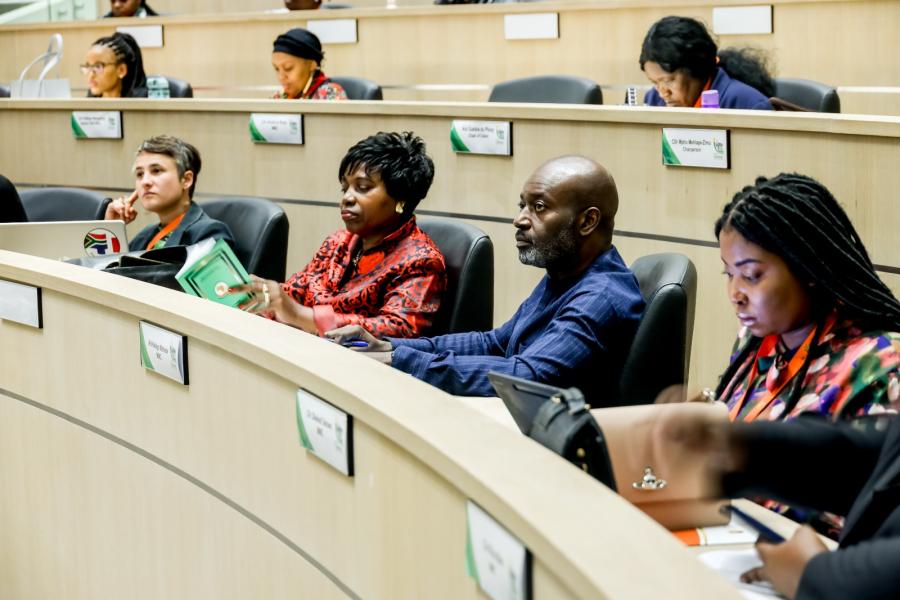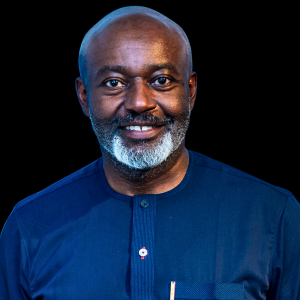Civil Society Preparatory Meeting for the CSW67
The CSW theme for 2023 is, “Innovation and technological change, and education in the digital age to achieve gender equality and empowerment of women and girls.

Thank you, Programme Director,
Good morning, your excellencies, ladies and gentlemen.
Allow me to acknowledge:
- Honourable Minister Maite Nkoana-Mashabane, Department of Women, Youth, And Persons with Disabilities
- Honourable Minister Thandi Modise, Minister of Defence and Military Veterans of South Africa
- TBC - Deputy Minister Philly Mapulane, Deputy Minister of Communications & Digital Technologies
- Honorable Ntombi Mekgwe – the Speaker of the Gauteng Provincial Legislature
- (Mum) Mandisa Monakali, Founder and President of Ilitha Labantu
- Dr Litha Musyimi-Ogana, African Commission on Human and People’s Rights (ACHPR)
- Your excellencies and ambassadors
- Leaders and representatives of civil society, women and youth organisations
- Representatives of government departments
- Representative of UN Women – Ms Aleta Miller and other participants from the UN family including UNICEF and UNAIDS
- Ladies and Gentlemen – all protocol observed.
It is an honour to join this august gathering focused on preparing the sixty-seventh session of the Commission on the Status of Women.
CSW67 that is taking place next month is indeed a critical platform that brings together multisectoral stakeholders on a global scale to mobilize and galvanize relevant interventions geared towards gender equality, while remaining steadfast in the prioritizing women and girls as we collectively forge towards an inclusive and sustainable world that leaves no one behind.
The CSW theme for 2023 to be deliberated upon by representatives of Member States, UN entities, and accredited non-governmental organizations, is, “Innovation and technological change, and education in the digital age for achieving gender equality and the empowerment of all women and girls”.
The internet is arguably one of the single most consequential developments in living history.
The COVID-19 pandemic has highlighted the impact of digital technologies in our lives, from e-learning to remote working. More-so, the global pandemic catalysed the development of new technologies as countries grappled with how to provide resources to citizens and continue to growth economies within the parameters of limited social contact.
If the world can deploy technology so rapidly to adapt in the past three years – then imagine the untapped potential of technologies if appropriately targeted at the economic empowerment of women and increasing gender equality.
Just access to the internet and digital devices can offer additional employment opportunities, income and knowledge – and most especially for the African continent.
Innovation and technological disruption is a positive key lever for change and access to big data and increased socio-economic participation within the global economy.
The 20th and 21st centuries have been characterized by unprecedented developments in communication technologies that have facilitated rapid global growth and cross-border integration.
However, the digital divide remains.
While large parts of the world have access to the internet, Africa’s access is still limited.
Two-thirds of the African population do not have access to the internet.
Moreover, advances in technology have not yet translated to the desired transformation on the ground for gender equality and women’s empowerment.
Instead, it poses a risk for entrenching the already existing structural barriers, bias and gender inequality.
Therefore, CSW67 serves as an opportune moment to advocate for an equitable digital age.
We must not leave any stone unturned when it comes to opportunities to leverage on technology and innovation for Africa.
Gender equality is an essential human right, it is at the core of efforts to realize the SDGs and it is a key component to realize regional integration, economic growth and social development.
In this regard many African leaders have committed to remove all forms of gender inequality at regional and national levels by ratifying relevant international instruments, promulgating and adopting legally binding treaties at continental and regional levels, as well as advancing persuasive soft law and policy instruments to address gender inequities and raise awareness on gender equality.
Technology presents an opportunity for accountability and social accountability on the same.
These ongoing efforts and political will from African leaders are evidenced in the recent 67th Pre-CSW67 Ministerial consultations at the end of 2022:
- leaders recognized that technology and innovation are positive disruptors in Africa and serve as a crucial pathway towards achieving Sustainable Development Goals and the AU’s Agenda 2063. However, what is of concern, is that women and girls remain at the periphery of this positive technological disruption.
- Beyond access to the internet, a political economy analysis of the continent shows that gender inequities persist, with women lagging behind in every societal sector. How then does the continent harness the potential of technological advancements in order to fully realize women’s economic rights?
- Some answers can be found in the reviewed and adopted Common Africa Position for CSW67 and the recommendations linked to Regional Digital Cooperation. The African Continental Free Trade Agreement (AfCFTA) regime may very well pivot the recommendations by way of utilizing technologies in breaking down intra-continental trade barriers and boosting Africa’s trading position. Features such as advanced technologies in the form of artificial intelligence; data management tools and payment infrastructure are critical in accelerating the benefits of intra-African trade while simultaneously increasing inclusive economic growth.
In line with the deliberations, and commitments at the recent Transforming Education Summit, the South African Government must be lauded for its growing efforts towards inclusion of gender equality in digitization, science and innovation.
I am encouraged by the fact that the Government is at the forefront of incorporating gender equality in the sciences. South Africa is strongly committed to the Generation Equality initiative. Action Coalition 5 of Generation Equality focuses on technology and innovation for gender equality.
Among the efforts that make up this action coalition is the need to reduce, by half, the gender digital divide across generations by accelerating meaningful access to digital technologies and universal digital literacy.
I want to recognise Government for continuing to prioritize transformation and gender equality in the science and innovation sector through the work by the national Department of Science and Innovation.
The Women in Science Initiative, led by the department, supports the inclusion of more women in science and technology:
- The Department of Education and the Department of Science and Innovation, in partnership with Siemens and UN Women, are partnering on the African Girls Can Code Initiative to encourage girls to take an interest in STEM subjects and eventually careers.
The efforts of the Umlambo Foundation to accelerate access to digital literacy are also commendable.
Excellencies, ladies and gentlemen,
More voices are urgently needed to intensify advocacy and mobilize tangible collaborations and actions. Today is just that step as we collectively commit to building back better with inclusivity, justice, equity, and more equality among all citizens.
As I conclude, I want to remind you that we have less than 8 years to realize the ambition of the SDGs to achieve gender equality.
Keep this in mind as you prepare for and attend the CSW next month and as leaders and stakeholders also prepare for and attend the SDGs midterm summit in September during the UN General Assembly.
We cannot achieve the SDGs without upholding women’s rights fully.
Therefore, we must be disruptive and catalytic– like technology itself has been and can be channeled and leveraged to empower women and girls.
There will not be any sustainable growth and development unless we resolve inequality AND commit to include women as stakeholders of the economy.
May the conversations and decisions here today and tomorrow inspire us to make bold and decisive changes in all our spaces.
To Ilitha Labantu, the Government of South Africa and organisations present - allow me to recommit the full support of the UN family in South Africa as you deepen the conversations ahead of the 67th session of CSW.
I wish you fruitful discussions.
Thank you
Speech by









